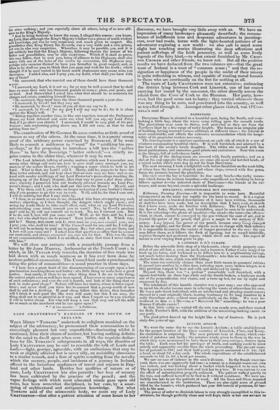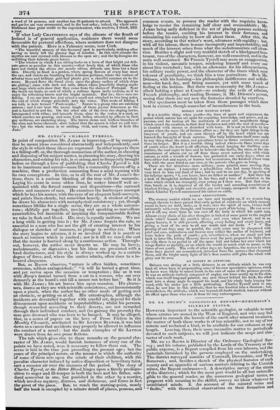LADY CHATTERTON'S RAMBLES IN THE SOUTH OP IRELAND.
WHEN Mister " TOM KINS " undertook to enlighten mankind on the subject of the aristocracy, lie pronounced their conversation to be exceedingly pleasant but very unprofitable—fascinating whilst it continued, from their charm of manner, but leaving nothing definite for the mind to dwell upon when over. With the requisite deduc- tions fbr Mr. TOMKINS'S enlargements in all ways, the Rambles of Lady C ATTERTON May be said to resemble the talk of Lords and Ladies—light, gossipy, agreeable, with an enthusiasm that may be weak or slightly affected but is never silly, an amiability obnoxious to a similar remark, and a flow of spirits resulting from the novelty which the scenery, people, and incidents of a journey in Ireland, offered to the luxurious appliances of travel and sojourn in Eng- land and other lands. Besides her qualities of nature or of caste, Lady CHATTEWTON has also pursuits : her love of scenery has been cultivated by the practice of the pencil; and the vague feelings with which most educated minds gaze upon old ruins, has been somewhat disciplined, in her case, by a smat- tering of arphiteetural and antiquarian knowledge. But what Tostxpts said of the aristocratic body, we must say of Lady CHATTERTON—that atter a patient attention of some hours to her discourse, we have brought very little away with us. We have an impression of many landscapes pleasantly described; the remem- brance of indifferent inns and desperate adventures in jaunting- cars, over bad roads, borne with the light-hearted patience of an adventurer exploring a new world : we also call to mind some slight but touching stories illustrating the deep affections and patient sufferings of the Irish peasantry, as well as some lively- legends of the fairy kind,—to what extent furnished by Mr. CROP. TON CHOKER and other friends, we know not. But all the positive results we have deduced from the two volumes are—that the great want of Ireland is a want of " common sense ; " and that the re- signation or happiness of the people in the midst of their misery is quite refreshing to witness, and capable of reading moral lessons to those who are continually on the fret for nothing at all.
The tours of Lady ClIATTERTON were not extensive; embracing the district lying between Cork and Limerick, one of her routes carrying her round by the sea-coast, the other directly across the island from the Cove of Cork to the Shannon. IIer party, how- ever, had the good sense not to hurry : they tarried wherever there was any thing to be seen, and penetrated into the country, as well as travelled through it. Amongst other places visited, was (MON.. NELL'S seat of
DARRYNANE.
Darrynane House is situated in a beautiful spot, facing the South, and over. looking a little bay, where the waves come rolling upon the smooth sands. The plantations near seem to thrive, well protected as they are from the Northern blast by a fine range of rocky heights. The house is an irregular pile of building, having received various additions at different times : the interior is most condortable, and affords the extensive accommodation which the hospi- tality of its proprietor renders necessary. The drawing-room is a spacious apartment, on each side of which is a row of windows commanding beautiful views. It is well famished, and adorned by a film bust of the owner's lovely daughter. The tables are covered with the latest publications, and numerous good prints and caricatures. Near this room is the library, full of well-chosen books.
The walls of the dining-room are covered with family portraits; and on a slab at the cud opposite the tire-place, arc some old spear and hatchet heads, of a mixed metal, which were dug up not far from Darrtmane. The next morning I took a delightful walk before breakfast on the sand-hills, at whose base the house is situated, and whose slope, covered with fine grass, forms the grounds beyond the plantation. The view over the bay is beautiful: its fine sandv beach—the rocky moun- tain which forms its western boundary—the magnificent sea breaking in heavy billows against it—the indented shore of Darrynane—the islands at its en- trance, and ocean beyond, create a splendid landscape.
KILLARNEY, INDESCRIBABLE BUT DESCRIBED.
Killarney, Tuesday Evening.—It is impossible to write here. Beautiful visions crowd on the miud too rapidly for the hand to record. It is a region of enchantment : a hundred descriptions of it have been writteu, thousands of sketches have been made, but no description that I have read, or sketch that I have seen, made me familiar with Killarney. The Upper Lake, and the Lower Lake, Muckruss, and Innisfallen, must be seen to be understood. It is the colouring—the gleam of sunshine—the cloud—the tone—the effect— what, in short, cannot be conveyed by the pen without the cant of art, and is beyond the power of the pencil, that ,gives a magic to the scenery of Kil- larney. a cry heyona um power of the penci,occause every t its line so rapidly, and the forms of objects seem to change with their colour ; it is impossible to convey the varlets, of images presented to the eve: the eye may follow them, as it follows the flash of ligtumg, but to record faithfully, requires thought and profound repose, which dwell not here. The aspect of nature is ever varying from grave to gay.
A CATHOLIC P.'s CURATE.
Before the miserable little shop of a blacksmith, whose whole property con- sisted of one old hat, a coat, an anvil, and a hammer, Father Casey stopped to hook up his horse' and beckoned us to follow Minn to a neighbourimr cottage, not much better-looking than the blacksmith's: into this we entered to take shelter from the rain, Which was still falling. The room was certainly cleaner than most Irish rooms in peasants' cabins; it opened into another by a thin door, tottering upon rusty broken hinges, in a. thin partition warped by heat and cold, and darkened by smoke. Beyond this, there was "a parlour" remarkably well furnished, with a square-leaf-table on three legs whole and the fourth broken, a bookcase much out of the perpendicular, two chairs, and a turn-up bed, for use by night and ornament by day. The inhabitant of this humble chamber was a poor man ; one who appeared to spend his shinier income more in relieving the wants of others titan his Orrn. tic Was a pale-faced individual, with an intellectual and pleasing countenance; dressed in a coat originally black, bearing testimony to its long duration by a, sadly threadbare state, evident more particularly on the folds. We were in- troduced to him as a Mr.—no, a " Reverend Mr." something: lie was a poor Roman Catholic curate In this little cabin we waited till the rain was nearly over, and then started for Bally Ferriter's Hill, with the addition of the interesting-looking curate to our party.
The good priest danced up the height like a boy of fourteen. He is just sixty-five years of age.
LUNATIC ASYLUM.
We went the same day to see the Lunatic Asylum; a noble establishment for the pauper lunatics of the three counties of 'Limerick, Clare, and Kerry. Its cleanliness is surprising. The men patients were at dinner, which con- sisted of potatoes and broth ; the potatoes wisely given to them in the way in which they were accustomed to have them in their own cottages, thrown upon the table. Each loan had his porringer of broth, and nothing could be more orderly and apparently sensible than the whole proceeding. The present num- ber of patients is 310; and their half-yearly support amounted to 51 14s. 5int a head, or about 7d. a day each. The whole expenditure of the establishment amounts to 151. Is. 6d. a head per annum. We saw no case of violence in the men's division. In the female exercise- yard, there was one apparently bad case ; a woman in a straight-waistcoat, who was violent, and was kicking about a bucket which happened to be near her. The keeper (a woman) intertered, and tied her to a tree. It was curious to see the effect of subordination properly enforced. The patient walked quietly to the tree, and suffered herselt to be tied to it without resistance. We were un- luckily too late to see the patients at work. All the linen and frieze required. are manufactured in the institution. There are also eight acres of ground tilled by the lunatics, which produced last year 500 barrels of potatoes, 60 bar- rels to the acre.
The power of order to diminish labour is very strongly exemplified in this in- stitution, for though perfectly clean and well kept, there is but one servant to a ward of 18 persons, and another has 30 patients to attend. The approach and garlen arc very ornamental, and in the best order; indeed, the whole esta- blishment does great credit to the superintendent, who receives, I think, 2501. a year. If what Lady CHATTERTON says of the climate of the South of Ireland is of general application, residence there would seem favourable for pectoral affections, where moisture does not disagree with the patient. Here is a February scene, near Cork.
"The beautiful scenery of this favoured spot is particularly striking after having so lately left the gloomy fogs of London. In this mild climate the myrtles are now covered with blossom in the open air ; and the hydraugias are unfolding their delicate green leaves.
" The window in which I am sitting looks on a lawn of that bright yet deli- cate green so peculiar to this country—that lovely tint, of which those who have not visited the divisa dal mondo ultinta Irlandu can form but a faint idea. Directly in front is a garden, where spring flowers of every hue meet the eye, and violets are breathing their delicious perfume, where the verdure of arbutus trees and brilliant gold-leaf plants give a cheerful summer air to the scene. Beyond flows the broad river, upon the glassy surface of which ships are gliding ; some with dark red sails, others whose gracefully sloping masts and large white sails show that they come from the shores of Portugal. Near the beach are boats, in each of which a solitary figure lazily reclines, as if to enjoy the refreshing breeze and the bright sunshine. But no ; these men are fishing. I see one man has just raised a small net attached to two lon,g poles, the end of which droops gracefully into the water. This mode of foaling, I am told, is here termed " Push-a-pike." Nearer is a group who are catching salmon ; and I can hear the merry laugh of these joyous fishermen as the lest is bandied to and fro. On the other side of the river rise sloping lawns, interspersed with villas ; and beneath them, close to the water, is a road, on which coaches are passing, and some Cork belles, attended by officers iu their gay uniforms, are cantering along. The brown stems and leafless branches of the elms and horse-chesnuts show indeed that the season is what we call win- s ter ; but the whole scene is so smiling, vivid, and warm, that it feels like June."



























 Previous page
Previous page